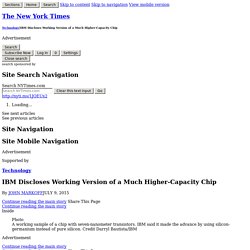

EyePatch Phone Cases for Camera Protection and Privacy – EyePatch Case. Intel's new storage chip is 1,000 times faster than flash memory. Hackers Remotely Kill a Jeep on the Highway—With Me in It. I was driving 70 mph on the edge of downtown St.

Louis when the exploit began to take hold. Though I hadn’t touched the dashboard, the vents in the Jeep Cherokee started blasting cold air at the maximum setting, chilling the sweat on my back through the in-seat climate control system. Next the radio switched to the local hip hop station and began blaring Skee-lo at full volume. I spun the control knob left and hit the power button, to no avail. IBM Announces Computer Chips More Powerful Than Any in Existence. Photo IBM said on Thursday that it had made working versions of ultradense computer chips, with roughly four times the capacity of today’s most powerful chips.

The announcement, made on behalf of an international consortium led by , the giant computer company, is part of an effort to manufacture the most advanced computer chips in New York’s Hudson Valley, where IBM is investing $3 billion in a private-public partnership with New York State, GlobalFoundries, Samsung and equipment vendors. The development lifts a bit of the cloud that has fallen over the semiconductor industry, which has struggled to maintain its legendary pace of doubling transistor density every two years.
Intel, which for decades has been the industry leader, has faced technical challenges in recent years. Moreover, technologists have begun to question whether the longstanding pace of chip improvement, known as Moore’s Law, would continue past the current 14-nanometer generation of chips. It’s Time to Take Mesh Networks Seriously (And Not Just for the Reasons You Think) The internet is weak, yet we keep ignoring this fact.

So we see the same thing over and over again, whether it’s because of natural disasters like hurricanes Sandy and Katrina, wars like Syria and Bosnia, deliberate attempts by the government to shut down the internet (most recently in Egypt and Iran), or NSA surveillance. After Typhoon Haiyan hit the Philippines last month, several towns were cut off from humanitarian relief because delivering that aid depends on having a reliable communication network. In a country where over 90 percent of the population has access to mobile phones, the implementation of an emergency “mesh” network could have saved lives. Compared to the “normal” internet — which is based on a few centralized access points or internet service providers (ISPs) — mesh networks have many benefits, from architectural to political.
Meet The Memcomputer: The Brain-Like Alternative to Quantum Computing. They underpin our economy, all mass communication, and at this point, even most of our government.

But make no mistake, scientists are quickly learning that our traditional computers—from your laptop to our most advanced supercomputers—are intrinsically slow and wasteful. It's a fact: certain, everyday problems we have computers solve are becoming exponentially—almost absurdly—harder and more time-consuming as more data gets thrown into the mix. And it's an unavoidable problem because its based in how all our computers work.
Advertisement - Continue Reading Below For some computer scientists, the solution lies in building quantum computers—devices which take advantage of the inexplicable weirdness of atomic-level physics. How Artificial Intelligence Will Make Technology Disappear — Snips Collective Publishing. This is a redacted transcript of a TEDx talk I gave last April at Ecole Polytechnique in France.

The video is not online yet, but I will post the link on twitter (@randhindi) as soon as it is! Last March, I was in Costa Rica with my girlfriend, spending our days between beautiful beaches and jungles full of exotic animals. This Windows 10 PC is the size of a phone charger, and 100% real. Microsoft has showcased a new form factor for Windows 10 devices, one that can actually be squeezed into a plug.

The Quanta Compute Plug was demonstrated by Microsoft's Nick Parker during his Computex keynote address in Taiwan. The mini-PC comes with two USB 3.0 ports and an HDMI port, allowing you to turn your TV into a smart computer. Users can control their TV using Cortana via a Bluetooth remote or headset. Parker didn't mention what version of Windows it will run but it is safe to assume that it will be a full Windows 10 model rather than Windows 10 for IoT.
Deja-vu? The Windows ecosystem is following what Android and Linux had done before. Google Project: Vault, Abacus, Soli, and Jacquard unveiled. Google focused on a few main projects at Google I/O last week that’ll soon lead to some big launches, including Android M, Google Now and Jump virtual reality.

But these are hardly the only things Google is working on right now. In fact, Google has four new projects that paint quite a picture for the future of computing. DON’T MISS: Google Photos is more than just free, unlimited cloud storage – 5 things you didn’t know Project Vault Detailed by Google’s Advanced Technology And Project group (ATAP), Project Vault aims to provide security and privacy via smart microSD cards to any device with microSD support. In addition to the actual SD card, the project includes a microprocessor, an NFC chip, and an operating system.